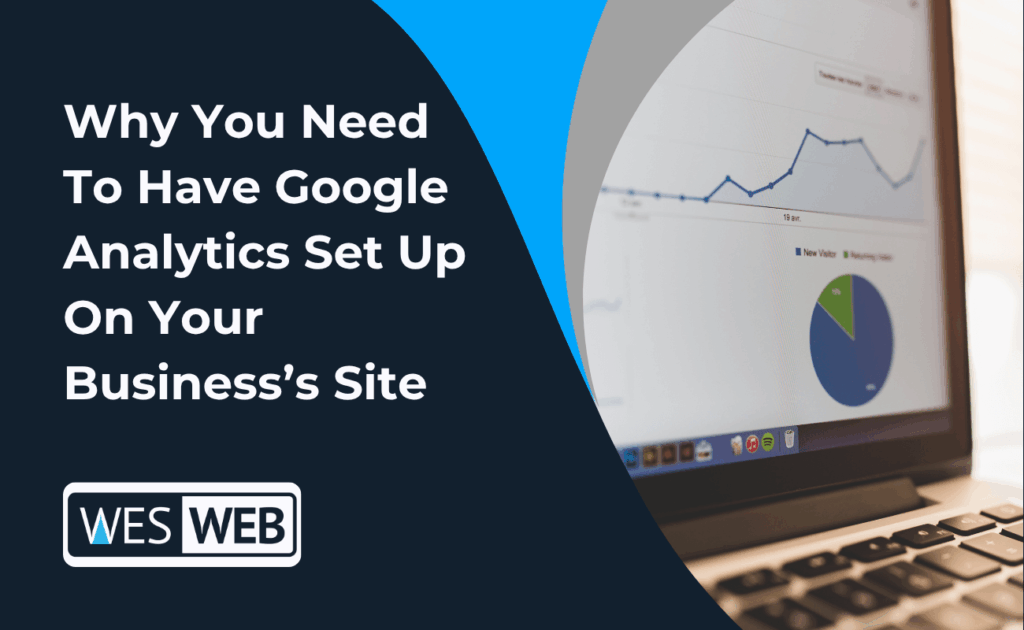If you own a business and have a website, then you understand the importance of data. Data provides valuable insights on so many different aspects of business, like sales, market trends, employee performance, financial well-being, and many more. In business, decisions based on gut feelings are not as successful as those made on data and evidence. Business owners know this, yet so many businesses are missing out on key data about their website that could help influence digital marketing decisions.
One of the easiest ways to get quality website data and analytics is by having Google Analytics set up for your business’s site. Google Analytics tracks important metrics like where your traffic comes from (paid search, Google search, social media), what your traffic is doing (filling out lead forms, reading about your products/services), and where quality leads are coming from.
Google Analytics offers a wealth of information that is sure to help business owners make decisions and move forward with purpose. Here are some reasons why every business needs to have Google Analytics set up for its website.
10 Benefits To Having Google Analytics Tracking
There are so many benefits to having Google Analytics set up.
1. Tracking Data With Google Analytics
We already briefly covered what Google Analytics can track, but that is truly just the tip of the iceberg. In addition to all of the metrics mentioned above, Google Analytics can tell businesses exactly how visitors are interacting with their website, and how much they click, scroll, and switch to different pages. It also tracks the different search terms that visitors used to find your site in Google and other search engines.
Another key factor of Google Analytics is the ability to compare and contrast data over time.
2. Historic Data To Help Guide Future Growth
Historic data is some of the best information that can help predict how your website will perform in the future. It gives insights into seasonal trends and traffic after key events in your industry, allowing you to already have knowledge of how your business will change over time.
For example, if your business is heavily impacted by government shutdowns or tariff increases, you can use historical data to see how your traffic changed the last time those things happened. And if any of those events are looming on the horizon, you can be prepared to react when your traffic changes.
Another example relates to seasonal trends in your business. Historical data can help you see slow and busy seasons in terms of website traffic, and can help you prepare for them ahead of time. Historical data is a valuable tool that gives you the ability to predict how your company will grow in the future, and should not be overlooked.
3. Lead & Form Tracking
Chances are, your website uses some sort of lead form to track customers who are interested in your products or services, and gives them the chance to leave their contact information so you can reach out to them. If you have contact forms on your site, tracking them is essential to truly understanding how leads are engaging with your site.
4. Track & Develop Marketing Funnels
Viewers who come to your site are likely at many different stages of the buying process. Some might be looking for information about the industry you are in, while others are actively considering your products and services, trying to figure out what option best fits their needs. Because people come to your site with different goals, its important to target them in different ways.
Analytics tracking allows you to see how users interact with your site, and what path they go down as they learn more about your company and start to decide whether or not they choose you to fill their needs. You can see how one prospective customer goes from viewing a blog post that answers their question, goes to service pages to learn more about the work you do, looks at “about us” pages to learn more about your team and brand, and then finally moves to “contact us” to start the sales process.
When you understand how your customers interact with your site across the marketing funnel, you can base your strategy around shortening the time it takes to get through the funnel, and increasing the chances that customers have to get to the final stage and start purchasing what you have to offer.
5. Create Button Tracking
Just like with contact forms, tracking button engagement is critical to understanding how viewers are engaging on your site. Analytics can tell you how many people are clicking, and where those clicks are taking them, giving you the opportunity to make sure viewers are getting the most out of the buttons you use.
6. See Where Your Leads Are Coming From
Wouldn’t it be awesome to know how your leads found out about your site? Analytics offers data about lead sources to inform you what channels are doing great, and what can improve. Analytics can break down your lead sources from paid search, organic search, organic social, direct, referral, and more, giving you information about how your marketing strategies are succeeding in driving traffic to your site.
7. Make Sure Your Marketing Company Is Doing Its Job
Any marketing company can make promises of record traffic and quadrupled leads, but it takes data to truly prove it. Analytics allows you to see what is really happening to your traffic, and can hold your marketing company accountable if things don’t seem to be going as well as they tell you they are.
8. Lets You Know How Your Site Is Being Read
Some data tracking platforms show how viewers scroll on your different pages, and can even provide heatmaps that show where on each page attracts the most attention. When you have this data, you can make sure that the high-impact areas of your site have engaging content and clear calls to action, making it super easy for leads to get in touch with you and start the sale.
9. Helps You Set Traffic & Engagement Goals
If you are looking to double overall website traffic or increase online conversions by 75%, Google Analytics is the first place to start. Analytics gives you baseline data which you can use to project what reaching your goals would look like. Once the time period is over, Google Analytics lets you quickly compare data across periods to see if you met your goal, and by how much your traffic and engagement increased over time.
10. Gives You Actionable Steps Towards Improvement
Data is great, but without a plan to improve the results, it can’t really accomplish anything. The beauty of data is in what it helps you do next. Data opens your eyes as to what is happening for your business and how things might look in the future, and gives you the chance to take action to either capitalize on the upcoming opportunities, or turn things around before a significant loss happens.
Why Does This Data Matter?
At first glance, you might think that Google Analytics results are just a bunch of numbers and lines that don’t make any sense. But when you take a closer look and comb through the data with a goal in mind, you can easily realize how your website’s data tells a story about your customers, their need, and their experience on the site.
When you have this data and understand the full story behind it, it shows you how your business is seen online, and how your interested leads want to work with your website. Once you understand their story, you can build a strategy that will help you target them and bring in that conversion.
Data Analytics Helps Guide Short & Long-Term Marketing Strategies
Data that helps you understand your customers wants and goals can help guide you as a business owner in how you want to target them. These analytics show you what the customer is looking for, when they are looking for it, and can even sometimes give insight into their pain points and challenges that they want to overcome with your product or service. The more you understand your customer, the better you can serve them. That’s what makes Google Analytics so valuable for businesses: it gives you the information you need to understand your customers. Once you have that info, you are able to make a plan that will target them and offer your product or service as the best answer to your process.
Additional Platforms With Valuable Site Data
Find Additional Data & Insights With Microsoft Clarity
Microsoft Clarity is a free tool that, like Google Analytics, offers data on site traffic and page interactions. However, its most valuable feature is the screen recording and heatmaps that it offers. Microsoft Clarity’s recordings give you the ability to view actual customer interactions with your site and watch as they scroll through your content and (hopefully) make it all the way to your call to action. Heatmaps give you the ability to see where viewers spend most of their attention looking at, and can help you find hotspots for engagement where you can add essential content and calls to action. Learn more about why your business needs Microsoft Clarity.
Find Additional Data & Insights With Google Search Console
Search Console is extremely beneficial in the way it can break down your page’s performance in search results. Search Console shows the real queries that customers are typing into Google that you show up for. This helps you to get a better understanding of what your audience is looking for and how you can make content to be the answer to their questions. Learn more about why your business needs Google Search Console.
Find Additional Data & Insights With Bing Webmaster
While Google gets the vast majority of searches, Bing is the next biggest search engine, with over 900 million searches a day. Bing is also an important source of information for AI models like ChatGPT and Claude. Webmasters gives you insight into how your site is performing in Bing, very similar to how Google Analytics works with Google Search. By understanding your performance in Bing on top of studying how Google is ranking your site, you can make a more well-rounded marketing plan that works effectively on multiple channels. Learn more about why your business needs Bing Webmasters.
Set Up Google Analytics To Get Valuable Insights Into Your Website’s Performance
Set your business up for success with data that helps you understand your customers and how your website is working. Integrate Google Analytics with your business’s website to start seeing how you can better target your customers and grow your business with an intentional, data-driven strategy.

